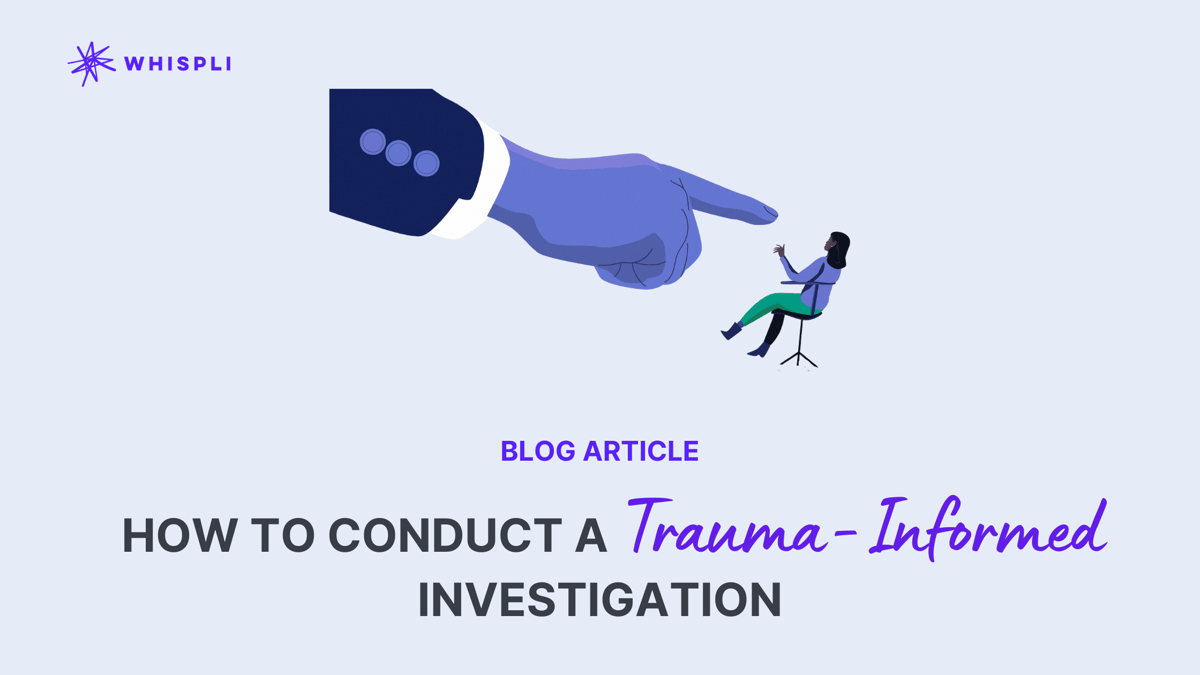How to conduct a trauma informed investigation

If you want to learn more about how to conduct a trauma informed investigation, you can watch our last webinar. Watch it now >

This blog post is a guest post from Harriet Witchell, founder of MyKludo.com| The online marketplace for investigation professionals
Understanding the impact of trauma is essential for anyone conducting investigations, particularly when these centre on bullying, discrimination or harassment complaints. Without a grasp of how trauma can affect evidence, the process may be seriously compromised, with witnesses also at risk of being put through further distress.
For this reason, the Sex Discrimination Commissioner, Kate Jenkins, has called for a ‘victim focused’ approach for dealing with sexual harassment investigations.
The concept of ‘Trauma Informed Practice’ is nothing new, having informed work in the mental health sector for decades. Now investigative practices are adopting this perspective, with a realisation that traditional interviewing methodologies can actually be harmful to the long-term wellbeing of witnesses and, in particular, the victims of bullying, harassment and discrimination.
The impact of bullying and harassment
When considering the scale of such complaints in Australia, it becomes apparent just how important it is to ensure investigations are conducted effectively in order to help combat bullying and harassment. Figures show that these situations cost our economy an estimated $34.7 billion each year. Moreover, two thirds of people who experience workplace bullying and harassment do not report it. 42% of these fail to report due to fear of repercussions. Adopting a victim focused approach for all investigations would be an important step in improving such statistics.
Understanding how people experience trauma
First we must consider how those who report bullying or harassment can experience trauma. Clearly, they may be traumatised from the present situation of bullying or harassment. However, the response to their complaint has the potential to cause secondary trauma, and there is always a possibility that the person may have also experienced trauma earlier in life that is currently being compounded.
As people respond in unique ways to their personal story of trauma, an investigator will not know what they are dealing with when someone makes a complaint. It is therefore vital that an investigator understands what trauma is, as well as its effects.
Trauma is an emotional response to an event that a person finds physically or emotionally threatening or harmful. It can be triggered by incidents that are repeated events, significant single events and or even through a close association with someone who experiences a traumatic event (secondary trauma).
Any of this can impact on a witness’ ability to recall information. Accordingly, memories may be fragmented, non-linear and subject to intrusive flashbacks which can contain inaccuracies. Similarly, the person may be at a loss to explain the absence of certain information.
How can organisations adopt trauma informed practices?
In order for an employer to ensure a victim-centric response, the following principles should be adopted:
- Listen without judgment
- Adopt protocols designed to minimise harm and prioritise the safety and wellbeing of victims
- Anticipate the distress caused and understand that victims may withdraw from work for a period of time
Ten tips for implementing trauma informed investigations:
- Listen to the complaint with sympathy and without interruption
- Ensure the safety and wellbeing of the reporter (and check on this for the duration)
- Allocate a support person (from the company) to facilitate communication on process, time-frames and the outcome
- Talk about privacy of information early
- Provide a timely, independent process for any investigation or resolution process
- Be patient in arrangements for meetings, interviews or written accounts
- Give the reporter some control over where or when they speak
- Build rapport during interviews
- Do not ask judgmental questions such as “why didn’t you… speak up / fight back / report it?” Rephrase these questions with: “How did you respond? Or what happened after that?”
- Do not expect or demand a linear memory, ask questions such as “What else happened?” rather than “What happened next?”
Conducting trauma informed investigations does require some significant changes in practice, but doing so is vital. Not only will this facilitate more effective ways of dealing with bullying, harassment and discrimination, but more importantly, the long-term wellbeing of witnesses will be supported.



